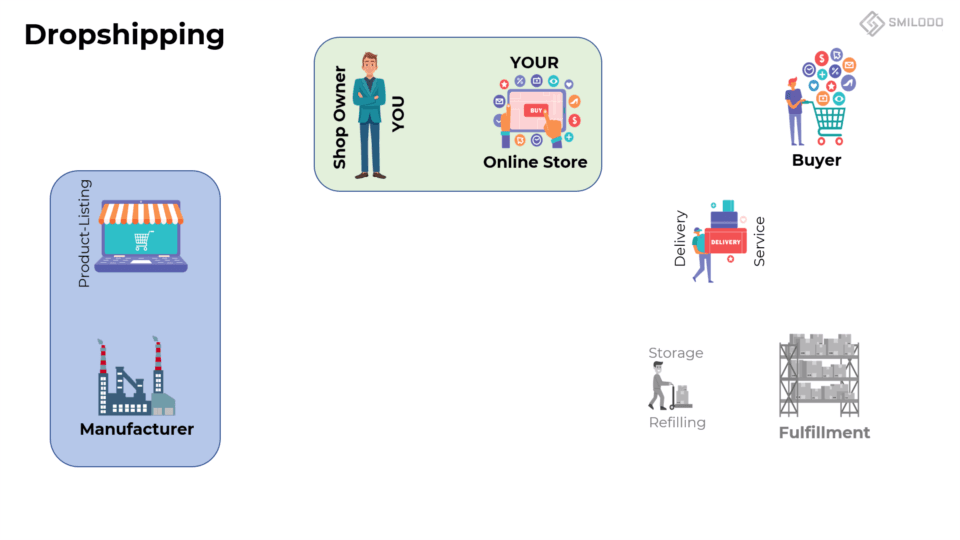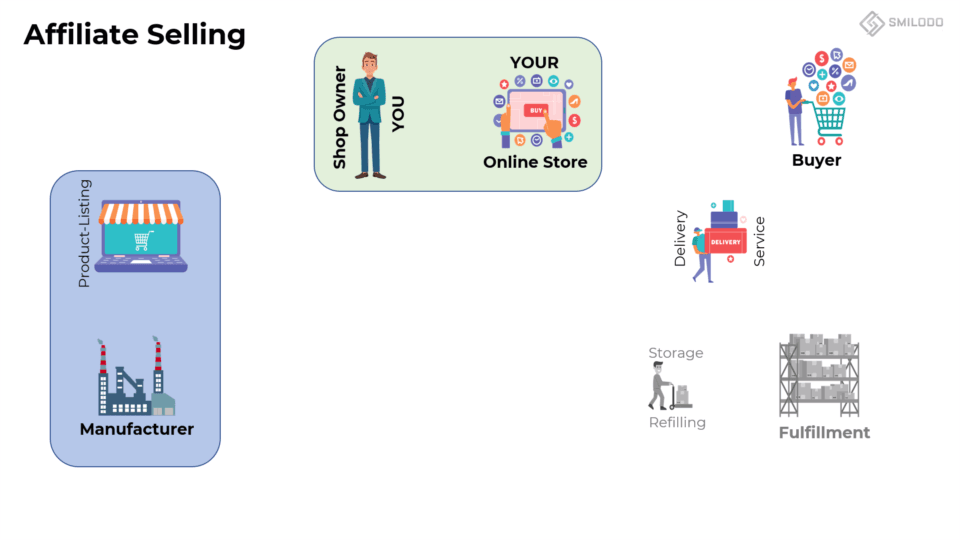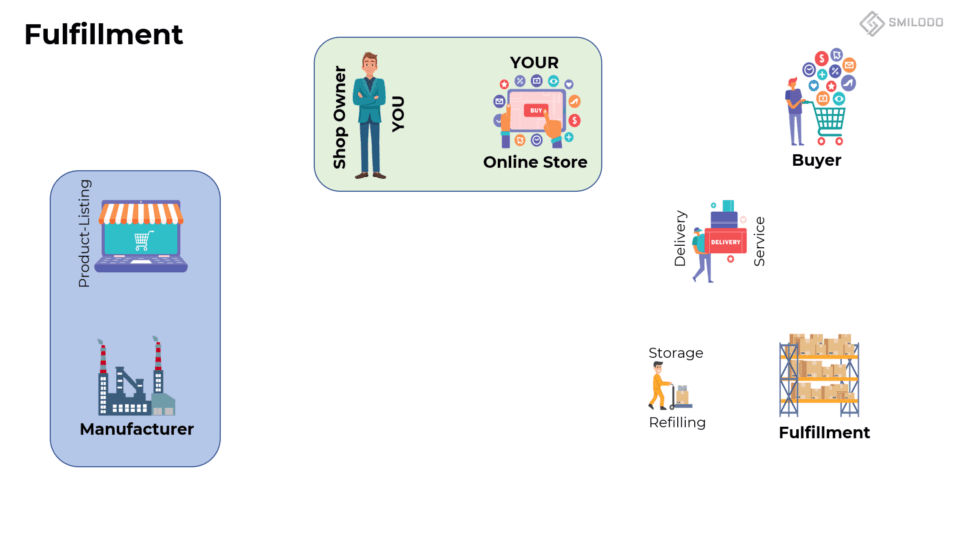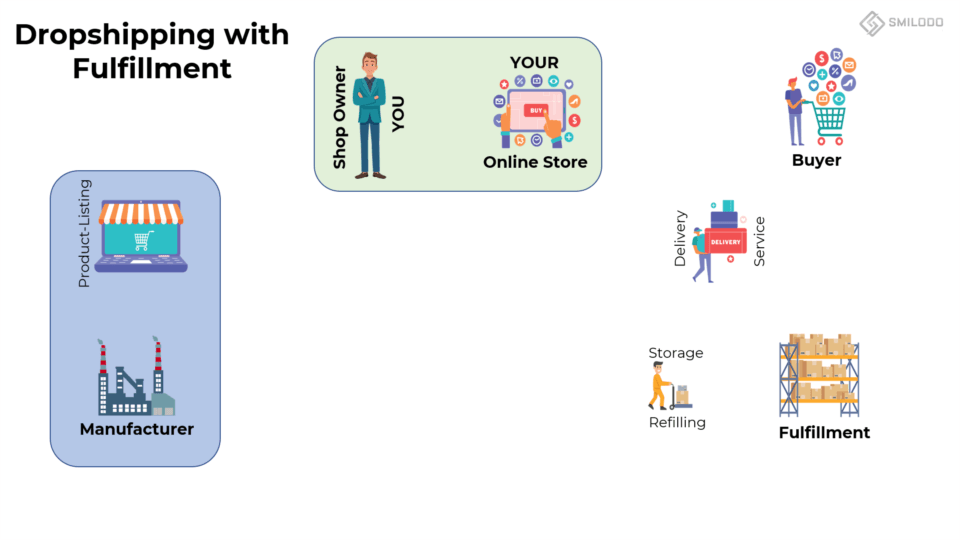“E-commerce and mobile commerce have changed the way brands reach out to their customers, making it both faster and easier for consumers to purchase their favorite products on the fly while avoiding the hassles of going to the store.”
- Hil Davis, Co-Founder of J. Hilburn
About 27.6% of the world population shop online in 2021 – a 4.4% year-over-year increase. With online shopping on the rise, global E-Commerce sales have been predicted to make up 22% of the overall retail sales by 2023.
The E-Commerce industry is booming. The internet is home to about 12-24 million E-Commerce stores. Moreover, thousands of entrepreneurs launch their online stores every single day.
Statista reported the global retail E-Commerce sales to stand at $4.28 trillion in 2020. This number has been expected to cross the $5.4 trillion mark by 2022.
“E-Commerce isn’t the cherry on the cake. It’s the new cake.” - Jean-Paul Agon, CEO of L’OREAL
People love online shopping. And if you are currently planning to launch your own B2C E-Commerce store, now’s the right time to do it. But, if you want to truly achieve success, you need to do it right. Don’t dive straight into the action. It’s a must to familiarize yourself with the different types of B2C E-Commerce models. Most importantly, you need to identify which model(s) better fits your needs.
This blog post lists out the different types of B2C E-Commerce models that entrepreneurs should know about. But, before we shift our focus toward them, you need to do a background check. By that, we mean that you need to understand where you currently stand.
And based on that, you can identify the right E-Commerce model(s) that fits your needs.
Where Do You Currently Stand?
If you plan to launch your own E-Commerce store, you may belong to one of these categories:
- Own a physical retail store, yet don’t manufacture your own products
- Manufacture your own products
- Don’t own a physical store nor manufacture your own products yet want to launch your own E-Commerce store
Different E-Commerce models may be a perfect fit for different categories.
Also, it’s important to note that the competition is quite fierce. Hence, you should conduct thorough market research and competitors’ analysis. Based on that, prepare a fool-proof game plan for your online store.
What if you are low on investment? What if you don’t have the time to set up your own manufacturing unit? What if you haven’t yet decided what to sell?
So, the smart move here is to devise a game plan that helps you understand where you currently stand.
Once you do, you can further identify the B2C E-Commerce model(s) that suits your needs.
8 Types of B2C E-Commerce Models You
Should Know About
Here’s the list:
- Wholesaling & Warehousing
- Dropshipping
- Private Labelling & Manufacturing
- White Labelling & Manufacturing
- Affiliate Selling
- Fulfillment
- Dropshipping with Fulfillment
- Service-Based Model
We’ll be impartially reviewing each of these models, helping you clearly identify the one perfectly suitable for your needs.
Wholesaling & Warehousing
The first one on our list is Wholesaling and Warehousing. This model involves purchasing products in bulk and storing them in warehouses. Here, it’s important to note that you won’t be manufacturing your own products.
Instead, you’ll be placing bulk orders. Once you do, your supplier(s) will ship the products to your online store warehouse directly. You’ll be partnering up with different merchants and suppliers.
You’ll be responsible for:
- Managing Inventory & Stock
- Keeping track of Your Customer Orders
- Tracking Shipping Details
- Investing in Warehouse Space
- And more!
Adopting this model requires a huge investment. So, if you don’t have a huge capital, then this model might not be a perfect fit for you. But, if you own a physical store, you may go ahead and sell your products locally. When it comes to international selling, it may turn out to be a bit difficult, as you’ll be required to lease warehouses across different countries.
So, it's advisable to adopt this model only if you have huge capital.
PROS
- Control Over Supply Chain
- Good Profit Margin, Depending on Market Demand
- Can Sell to Both Businesses & Consumers Easily
CONS
- Huge Capital Required
- Need to Manage Inventory & Stock
- Can Lose Money if There’s Not Much Market Demand
Dropshipping
“Dropshipping is the entry point for different people to business, entrepreneurship, and E-Commerce.
It's the perfect entry point."
- Lachlan Delchau-Jones
33% of E-Commerce stores harness the power of dropshipping. It’s one of the simplest forms of E-Commerce business models. This model is suitable for almost everyone planning to launch his/her own E-Commerce store.
Let's say you are completely new to the E-Commerce world yet don't know what to sell. You may not even have the funding to bulk-purchase products from suppliers. But that shouldn't stop you from launching your own E-Commerce store and chasing your dreams.
With dropshipping, you can set up your own E-Commerce store without bulk-purchasing different products. Instead, you’ll be tapping into the rich inventory of dropshipping suppliers and finalize the products you'd like to sell in your store.
Once you have prepared a list, you need to list those products in your store. Your core responsibility will be to market your E-Commerce store. Run marketing campaigns to reach out to your prospects and convert them into paying customers.
When you receive an order, your online store will pass it to your dropshipping supplier. And from there, they will be responsible for shipping the products and delivering them to your consumers.
You won’t have to worry about:
- Managing inventory
- Packaging product(s)
- Warehouse stocking
- Shipping
All you need to do is focus on marketing and long-lasting building relationships with your customers.
PROS
- Doesn’t Require Big Initial Investments
- Doesn’t Require Inventory Maintenance
- Requires the E-Commerce Store Owners to Only Focus on the Marketing Part
- Fierce Competition
- Finding Reliable Suppliers is Difficult
- Low-Profit Margins, Depending on Your Dropshipping Supplier
- No Control Over Supply & Service
Private Labelling & Manufacturing
You may have the perfect product in your mind yet find yourself struggling with setting up your own factory. Maybe, you don’t have the much-needed capital to do so. Or what if you don’t have the resources?
So, what you can do is contact a third-party manufacturer and specify your requirements about the product that you’d like them to produce.
Tell them everything – how it's built and packaged, what goes in it, and what it looks like. They will then manufacture the product(s) and deliver them to your warehouse or store. This model will help you save huge bucks, as you won't be required to set up your own manufacturing unit and hire the manpower. You'll be selling these products under your brand name and have complete control over:
- Pricing
- Branding
- Production
- Profitability
So, if you have the perfect product in mind and decent capital, you may reach out to the manufacturers and private label your own product.
PROS
- Better Control Over Pricing, Branding, Production & Profitability
- Can Build Your Own Product & Sell it Under Your Brand Name
- Upper Edge Over Competition
- Get Brand-Driven Benefits
- No Real Control Over Quality
- Unknowingly Sourcing Through Unethical Sources
- Procurement & Inventory Control Constraints
- Need to Manage Inventory & Stock
White Labelling & Manufacturing
We've seen most people confuse white labeling with private labeling. Some people even believe that these models are the exact same.
But, let me assure you that there’s a huge difference between these models.
When it comes to white labeling, you won't be reaching out to a manufacturer and ask them to build your own product under your brand name.
Instead, you’ll choose a product that’s already successful among people. And you can ask the manufacturer to brand that exact same product under your brand’s name. The same product will be sold with a completely different white-label and package design.
Here, you will be responsible for managing:
- Customer relationships
- Supply chain
- Distribution channel
PROS
- Increased Supply
- Reduced Cost of Production
- Upper Edge Over Competition
- Rapid Brand Growth
- Complete Control Over Customer Relationships, Supply Chain & Distribution Channel
- No Real Control Over Quality
- Expensive Implementation
- Upper Edge Over Competition Requires You to Take Complete Responsibility in Case of Complaints from Customer
- Increased Supply Chain Cost
- Not Suitable in the Long-Term
Affiliate Selling
Affiliate selling is one of the oldest yet effective promotional models where:
- You can select products on the manufacturers’ product-selling lists.
- Then, you can list the selected ones in your online E-Commerce store.
- Further, market your store and the products.
- Once the buyers land on your website and click on a product, they will be redirected to the manufacturer’s listing.
- For each successful sale, you’ll receive a commission fee.
As simple as that!
Here, you don't need to manufacture your own product. You won't even be responsible for tracking inventory and sales, managing orders, shipping products, or anything.
Instead, all you need to worry about is the marketing part. That’s all.
PROS
- No Investment Required
- Requires You to Only Focus on Marketing
- Ability to Build Long-Lasting Relationship with Other Brands
- No Real Control Over Quality
- Lower Profit Margin When Compared with Other Models
- Not Suitable in the Long-Term
Fulfillment
One of the biggest problems E-Commerce store owners face is warehousing their products. Leasing warehouses is costly. But you obviously can’t store all of it in your physical store, even if you have one.
And it’s way worse if you sell your products internationally. What if you could bulk-ship your popular products, rather than having to individually ship them and paying those hefty fees? But, even if you did bulk-ship them, you’d need a warehouse, right?
Another big challenge: let’s assume that your buyers live in Ukraine. However, if the products are manufactured in India, then it might take forever for the buyer to receive that product, assuming you don’t already have a warehouse in Ukraine.
And that’s where Fulfillment comes in.
Here, you can either choose to manufacture your own products or list the ones on the manufacturer’s product list in your online store.
Rather than leasing a warehouse or individually shipping products when you receive an order, the manufacturer will ship it to the fulfillment service.
Now, when buyers purchase the product(s) on your online store, they will be required to pay an extra fee to cover the fulfillment service costs.
The order will be forwarded to the fulfillment service and will be shipped by them directly.
PROS
- Ability to Offer Speedy Delivery
- Doesn’t Require Businesses to Invest in Warehouses
- Fulfilment Services Manages Inventory & Ships the Products
CONS
None
Dropshipping with Fulfillment
This right here is one of the best E-Commerce models that you can adopt. It’s a perfect combination of Dropshipping and fulfillment service.
Here, you’ll firstly tap into the dropshipping supplier’s inventory and selecting the products you’d like to sell on your online store. Initially, the dropshipping supplier will be directly shipping these products to your customers.
However, over a specific time, you can track the relevant metrics to identify the best-selling ones. Once you do, reach out to the dropshipping supplier and ask them to bulk-ship these products to the fulfillment service.
So, every time you receive an order, it'll automatically be redirected to the fulfillment service. In case the fulfillment service runs out of stock, the order will be redirected to the dropshipping supplier. They’ll then be responsible for packaging and shipping the products to your customers.
PROS
- Doesn’t Require Big Initial Investments
- Doesn’t Require Inventory Maintenance
- Requires the E-Commerce Store Owners to Only Focus on the Marketing Part
- Ability to Offer Speedy Delivery
- Doesn’t Require Businesses to Invest in Warehouses
- Fierce Competition
- Finding Reliable Suppliers is Difficult
- Low-Profit Margins, Depending on Your Dropshipping Supplier
- No Control Over Supply & Service
Service-Based Model
E-Commerce isn’t just about selling products online. Instead, you may offer different services like:
- Digital Marketing
- Graphic Design
- Copywriting
- Massage
- Real Estate Consultation
- And various others!
So, you may build your E-Commerce store and list out the services you’d like to offer.
Once your clients land on your website and reach out to you, you may discuss their requirements and provide them top-notch service.
PROS
- Doesn’t Require Big Initial Investments
- Higher Profits
- No Shipping Required, depending on the Service Offered
- None
Ready to Launch Your B2C E-Commerce Store?
Like we discussed already, the E-Commerce market is booming. But, with increasing demand, more and more entrepreneurs are launching their own E-Commerce store.
So, it’s critical to adopt the E-Commerce model that fits your needs and budget. Maybe, you don’t have the time to focus your efforts on managing inventory and shipping your products.
So, in that case, you may automate the entire process by reaching out to dropshipping suppliers. But, if you have the much-needed funding, you may go with wholesaling and warehouse.
If you want to sell your brand-labeled products, then you may unlock the full force of private labeling or white labeling.
So, what are you waiting for?
Build your B2C E-Commerce game plan today.
Start with Smilodo here.




